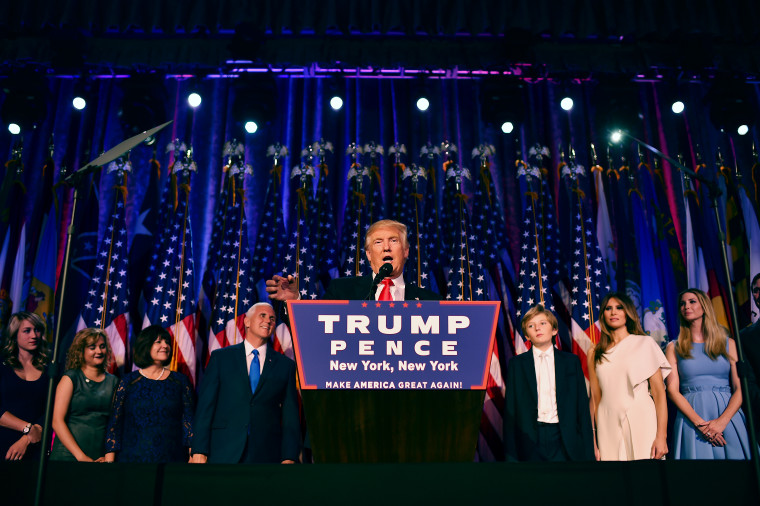Republicans who opposed Donald Trump found themselves in an odd position on Wednesday, as reality sunk in that the Republican nominee they warned would lead the party to ruin instead led them into the White House with a Republican Congress.
With the sudden prospect of a historic governing majority in front of them, a number of Trump critics took a new look at the candidate they had criticized as unqualified or offensive.
"This needs to be a time of redemption, not a time of recrimination,” Speaker Paul Ryan, who had clashed with Trump repeatedly over the campaign but ultimately campaigned for him, said in a press conference.
Old foes wished him well: Jeb Bush, who called Trump the “chaos candidate” in the primaries and refused to vote for him, offered congratulations and prayers. The National Review’s editors, who devoted an issue to opposing his candidacy under any circumstances, congratulated him too and urged Congress to “do what they can to reinforce Trump’s better instincts.”
Related: Trump's Win Stuns Latinos, Immigrants Worry About Their Future
This difference was especially pronounced on foreign policy where dozens of conservative experts and former aides had denounced Trump in the primaries and general election. Now some urged their colleagues to join Trump, who has little experience and a small inner circle, in the hopes they could nudge him away from potentially ruinous terrain.
“I would urge all national security professionals to serve if asked,” Max Boot, a former Rubio adviser who had assailed Trump throughout the race, said in an email. “Trump knows little about foreign policy and needs all the guidance he can get. This is the area where the president has the greatest discretion.”
Avik Roy, a policy adviser to a number of presidential candidates focused on health care, had derided Trump’s philosophy as “white nationalism” during the campaign. But he too was concerned that Trump needed proper guidance and the government needed to function, guidance that only seasoned hands could provide.
“I’m of the view that good people should serve in a Trump administration,” he said. “The federal government has so many important responsibilities that affect hundreds of millions of Americans, and the government needs good people to administer those responsibilities.”
Others were more concerned about placing restraints on Trump, who has showed an instinct toward revenge and little regard for constitutional limits during his campaign.
“If you think Obama was bad on executive overreach — he was — you have no idea what you’re in for,” Tom Nichols, a professor at the U.S. Naval War College and former Senate aide, tweeted. “Vigilance and engagement are key now.”
For those focused on domestic policy, Trump suddenly put them in position to enact vast swaths of their agenda that were a week ago considered unthinkable under an expected Clinton administration.
“I think he has a mandate to do what he campaigned on, to repeal and replace Obamacare, to put constitutional scholars on the Supreme Court,” NRSC chairman Sen. Roger Wicker (R-MS) said in a press conference.
Related: Justice Ginsburg Wearing 'Dissent' Collar Following Contentious Election?
Striking a note of caution, however, Senate Majority Leader Mitch McConnell warned Republicans to avoid “overreaching.” He said the Senate should emphasize bipartisan cooperation even as he pledged to undo Obamacare.
Wisconsin Governor Scott Walker, who supported Trump’s general election campaign, suggested the Senate abolish the filibuster entirely in order to clear the way for repealing Obamacare.
“They can’t allow inside the ballpark politics to stop some of these reforms,” he told radio host Charlie Sykes, a prominent anti-Trump commentator.
Other possible items could include a major tax cut, repealing Dodd-Frank financial legislation, building a border wall and passing new investments in bridges and highways.
On the other side of the aisle, House Minority Leader Nancy Pelosi was one of a number of top Democrats to extend an olive branch and suggest they might find common ground if Trump lets them.
"We can work together to quickly pass a robust infrastructure jobs bill,” Pelosi said.
In almost every way, the first twelve hours of the Trump transition resembled on both sides the kind of congenial post-election that Americans have come to expect. It was a jarring shift from an election in which Democrats and many Republican leaders called Trump unfit for office while Trump shredded political norms left and right.
“We are now all rooting for his success,” President Obama said of the man who led a years-long "birther" campaign to deny his legitimacy based on a debunked conspiracy theory.
“Donald Trump is going to be our president,” Clinton said of the man who threatened to jail her in the final weeks of the campaign. “We owe him an open mind and a chance to lead.”
Senator Bernie Sanders, Clinton's primary challenger-turned-surrogate who was also deeply critical of Trump, outlined where he was prepared to find common ground with the Republican in a statement Wednesday evening.
“To the degree that Mr. Trump is serious about pursuing policies that improve the lives of working families in this country, I and other progressives are prepared to work with him," the statement, which did not offer congratulations, said. "To the degree that he pursues racist, sexist, xenophobic and anti-environmental policies, we will vigorously oppose him"
Meanwhile, former Defense Secretary Leon Panetta, who endorsed Clinton, told MSNBC that Trump’s unorthodox political profile — he’s flip flopped on many issues and bucked Republicans on items like entitlements — might even provide the basis for a constructive relationship.
“We're not sure he's a Republican, we're not sure he's a Democrat, he can very well put together the right kind of coalition that can help this country govern itself,” he said.

